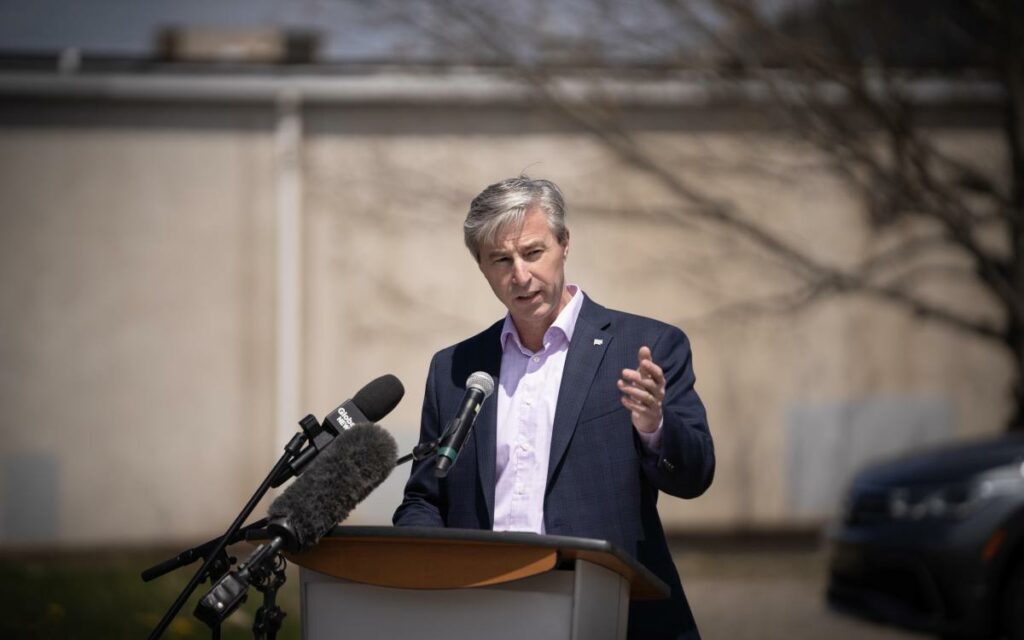
Nova Scotia Premier Tim Houston’s spending surge raises concerns over future taxpayer burden as deficits soar. Photo credit: Twitter/Tim Houston
Nova Scotia Premier Tim Houston is driving his province towards a fiscal cliff. If he doesn’t change course soon, taxpayers will be in for a world of hurt.
Houston didn’t inherit a rosy financial situation. In the previous Liberal government’s final budget before Houston won the 2021 election, former premier Iain Rankin announced plans to spend $12.4 billion and run a $585 million deficit.
But not long after Houston entered the premier’s office, governments across Canada started to enjoy a tax windfall triggered by soaring inflation.
The Nova Scotia government’s revenue increased by $2.4 billion, more than double the inflation rate, during Houston’s first two years in office. Balancing the books should have been a walk in the park.
Instead of seizing an opportunity to get Nova Scotia’s finances back in order, Houston unleashed a spending binge that would make Prime Minister Justin Trudeau blush.
In just 24 months, Houston increased government spending by more than 18 per cent, nearly double the inflation rate.
Houston ballooned Nova Scotia’s debt by $1.7 billion over the past two years and plans to increase it by an additional $3.7 billion over the next three years.
That means by the time Houston has completed his first five years in office, Nova Scotia’s debt will have grown by $5.4 billion and will hit $23.2 billion. That’s about $23,000 per person.
For comparison’s sake, during the same two-year period Houston increased Nova Scotia’s debt by $1.7 billion, the New Brunswick decreased that province’s debt by roughly $2 billion.
Exploding debt was never inevitable. It was the result of Houston’s policy choices.
When Houston ran for premier in 2021, he promised to spend more on health care and told taxpayers to accept modest deficits as a consequence.
“I’m comfortable running deficits in the short-term in order to make investments needed in health care,” Houston told Nova Scotians.
The truth is that Houston is playing the health-care card to justify massive new spending across the board.
The Houston government will spend $4.8 billion this year on health care. That’s $700 million more than what the Rankin government spent in 2021.
But spending is up by $2.5 billion since Houston took office. That means just 28 per cent of all new spending Houston unleashed is actually goes towards health care.
If Houston rolled back all of his new non-health spending to 2021 levels, Nova Scotia’s projected $279 million deficit this year could be turned into a $1.5 billion surplus.
That would maintain Houston’s new health care spending while lowering the debt burden for future generations.
Instead, Houston plans to keep the party going with taxpayers’ money. He’s planning to allow deficits to soar to $610 million by 2025-26 and has no plan to balance the books.
Unfortunately for taxpayers, all this new spending has consequences.
The Houston government is spending more than $800 million on debt interest charges alone this year. That’s nearly enough to pay for a brand-new hospital. And interest payments are set to rise even more in the years ahead.
There’s a cautionary tale Nova Scotians should be aware of.
When debt got out of control in Saskatchewan in the 1990s, NDP premier Roy Romanow had to cut spending by 10 per cent, close 52 hospitals and hike taxes in order to get the province’s fiscal house in order.
Houston needs to act before Nova Scotia faces the same daunting choices, including cuts to health care.
If he fails to act, future generations will face painful spending cuts and massive tax hikes because Houston chose not to make tough choices.

Jay Goldberg is the Ontario Director at the Canadian Taxpayers Federation. He previously served as a policy fellow at the Munk School of Public Policy and Global Affairs. Jay holds a Ph.D. in Political Science from the University of Toronto.




















